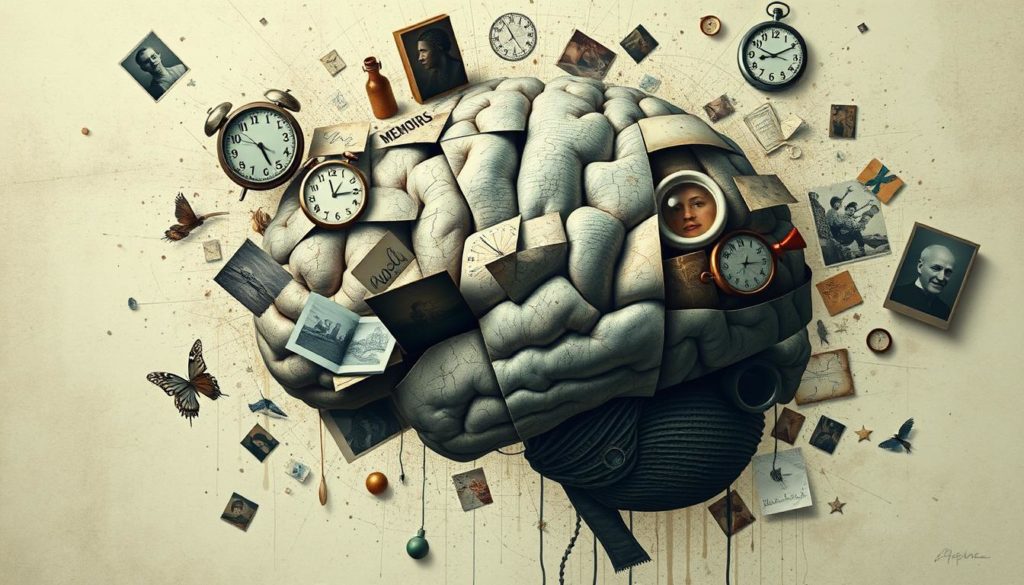Did you know Alzheimer’s is the sixth leading cause of death in the U.S.? This fact highlights the severe physical impact Alzheimer’s has on people. It leads to cognitive decline and physical symptoms.
The disease affects coordination, balance, and mobility. It can also lead to other health issues, making daily life hard.
Alzheimer’s progression leads to big changes in the brain. These changes affect memory, behavior, and mood. This makes physical challenges even tougher for patients.
Understanding Alzheimer’s physical effects is crucial. It helps us provide better care and support. As research progresses, we learn more about this disease’s impact on the body.
Cognitive Decline Symptoms in Alzheimer’s Patients
Understanding early Alzheimer’s signs is key for prompt action. Cognitive decline means a drop in thinking skills.
Cognitive Impairment Signs
Early Alzheimer’s signs include subtle shifts in thinking. People may find focusing hard, struggle with solving problems, and can’t do usual tasks well. Getting mixed up about time and place is also common.

The Alzheimer’s Association says these early signs are often missed. They become clear when they affect daily tasks. Spotting these signs early is vital for controlling the disease.
Memory Loss in Alzheimer’s Disease
Forgetting things is a main sign of Alzheimer’s. It begins with not recalling recent happenings or names. Later, even old memories start to fade.
Losing personal memories is very hard. It affects the patient’s identity and ties with family and friends. Because of this memory loss, daily life gets much tougher, leading to a lower life quality.
While Alzheimer’s affects people differently, noticing symptoms early aids in managing and slowing its impact.
Memory Loss Impacts on Daily Life
Memory loss greatly affects those with Alzheimer’s. It disrupts everyday tasks and social activities. Knowing how memory loss changes daily life helps caregivers and families support their loved ones better.
Short-Term Memory Loss
Short-term memory loss marks the start of Alzheimer’s for many. It makes it hard to remember new information. This can cause people to ask the same questions over and over or have trouble following talks.
It also makes simple tasks, like cooking or shopping, hard to do. Caregivers see that those with Alzheimer’s often lose things or can’t recall names and recent happenings. This means they need more help and checks.

Long-Term Memory Loss
As Alzheimer’s gets worse, long-term memory starts to fade. This means losing the ability to remember past events or recognize people. When someone can’t remember their loved ones, it hurts relationships.
Losing long-term memory also means losing independence. Even well-known places can seem strange. Adjusting care is essential to keep them safe and happy as these challenges grow.
Knowing both short-term and long-term memory loss helps us understand Alzheimer’s better. This knowledge aids in finding the best ways to care for and support those affected.
Behavioral Changes Consequences
Alzheimer’s behavior changes can greatly affect patients and their families. It’s key to understand and recognize these changes to manage the condition well.
Increased Aggression
Increased aggression is a tough part of Alzheimer’s. Patients might suddenly get angry, which can be scary for caregivers. Knowing how to deal with aggression needs support from doctors and families:
- Identify triggers: Finding out what causes aggression helps in handling these moments better.
- Stay calm: Being calm can help make aggressive situations less tense.
- Professional guidance: It’s important to get advice from experts in Alzheimer’s care.
Social Withdrawal
Patients often start avoiding social activities as Alzheimer’s gets worse. They may feel confused, frustrated, or embarrassed about losing their mental abilities.
“It’s heartbreaking to see our loved ones retreat into solitude. Understanding and addressing the reasons behind social withdrawal is vital in keeping them engaged and improving their quality of life.” – Caregiver’s Testimonial
Here are ways to handle social withdrawal:
- Encourage them to join in simple group activities.
- Help them have a daily routine for added security.
- Introduce them to groups or therapy that can support them.
Knowing how to manage aggression and social withdrawal can help improve life for those with Alzheimer’s and their loved ones.
| Behavioral Change | Impact | Management Strategy |
|---|---|---|
| Increased Aggression | Heightened stress for both patient and caregiver | Identify triggers, stay calm, seek professional help |
| Social Withdrawal | Isolation leading to potential depression | Encourage participation, create routines, introduce support groups |
Motor Function Decline
The decline in motor function deeply affects Alzheimer’s patients every day. Learning about the worsening of motor skills in Alzheimer’s helps in dealing better with the disease. One early sign is not being able to move smoothly.
These coordination problems make easy tasks hard. Things like buttoning a shirt or tying shoelaces become tough jobs.
Difficulty with Coordination
Coordination issues get worse with time in Alzheimer’s patients. This makes everyday activities challenging. Occupational therapists say certain exercises can help with coordination problems for a while.
Neurologists recommend custom exercises for maintaining some independence.
Loss of Balance
Loss of balance is another big problem. It can cause falls and serious injuries. Balance problems don’t just hurt physically but also shake confidence in moving around.
To lower fall risks, experts suggest using walking aids and making home safer. These safety steps are often advised.
| Aspect | Impact | Recommendations |
|---|---|---|
| Coordination | Difficulty performing daily tasks | Occupational therapy, physical activities |
| Balance | Increased risk of falls | Walking aids, home modifications |
Communication Difficulties Manifestation
Communication poses a big challenge for caregivers and those with Alzheimer’s. Knowing how to communicate with Alzheimer’s patients is key. It greatly affects their life quality.
The language decline in Alzheimer’s happens in stages. It starts with small trouble finding words. Then it worsens, affecting speaking and understanding. These stages create significant Alzheimer’s communication barriers.
This makes it tough for patients to express their needs. And for caregivers to get what they’re saying.
We must use therapeutic methods and change how we communicate to help. Tools like visual aids, simple speech, and body language can bridge communication gaps.
Here are some approaches to adapt:
- Speak clearly and simply
- Use gestures and facial expressions
- Give choices to help them decide
Understanding the language decline in Alzheimer’s stages helps caregivers. They can use these strategies to improve communication. This boosts the autonomy and dignity of their interaction.
Brain Deterioration Signs in Alzheimer’s
Alzheimer’s disease causes many changes in the brain that we can see with special scans and tests. It leads to the loss of both cognitive and motor skills over time.
People with Alzheimer’s might forget things, have trouble planning, and find it hard to make decisions. Studies using scans show the brain areas like the hippocampus get smaller.
The disease causes nerve cells to die and the brain to shrink. This is a key sign of Alzheimer’s. As more cells die, harmful plaques and tangles form, making it hard for brain cells to talk to each other.
| Observable Symptom | Neuropathological Finding |
|---|---|
| Memory Loss | Hippocampal Atrophy |
| Disorientation | Temporal Lobe Damage |
| Difficulty Problem-Solving | Frontal Cortex Degeneration |
The link between what we can see and the damage inside the brain shows how serious Alzheimer’s is. Knowing this helps doctors diagnose and treat it better. Catching the disease early is key to slowing it down.
Alzheimer’s Effects on the Body
Alzheimer’s disease isn’t just about memory loss. It affects the whole body. Knowing how it impacts the body can help in giving better care. Let’s look at how Alzheimer’s causes physical harm and complications.
First, Alzheimer’s seriously harms the heart and blood vessels. Patients may face more heart and blood vessel diseases. This shows why treating Alzheimer’s needs a full-body approach.
Also, people with Alzheimer’s often have trouble with their muscles and joints. They might find it hard to move around, raising the chance of falls. Tasks like walking or eating become difficult.
“My father could hardly walk without assistance during his last months. It was heart-wrenching to see his physical deterioration on top of his cognitive decline,” shared Judith Harris, a dedicated caregiver.
Next, Alzheimer’s often leads to stomach and eating problems. It can make it hard to eat well, causing weakness or dehydration. This makes overall health even worse.
- Cardiovascular complications: Hypertension, atherosclerosis
- Muscle and joint issues: Limited mobility, increased fall risk
- Gastrointestinal problems: Swallowing difficulties, malnutrition
The immune system also suffers with Alzheimer’s. Patients get sick easier and heal slower. This is key in understanding the disease’s wide-ranging effects.
Last, Alzheimer’s often comes with other chronic conditions like diabetes and lung problems. This makes treating Alzheimer’s more complex. It’s important to see the big picture in managing this disease.
Neuropsychological Symptoms of Alzheimer’s
Alzheimer’s isn’t just about losing memory. It greatly affects emotions and mental well-being too. Those with the disease face various neuropsychological symptoms. These make daily life and social interactions harder. For caregivers and families, knowing these symptoms is key. It helps them understand the disease better and offer care that comes from the heart.
Mood Swings
People with Alzheimer’s often have sudden mood changes. They can quickly go from calm to upset or from sad to irritable, for no clear reason. These shifts are hard on the patient and those around them. It’s critical to be patient and understanding. Keeping things consistent and offering comfort can help smooth out these mood swings.
Anxiety and Depression
Many with Alzheimer’s also face anxiety and depression. The sadness comes from knowing they’re losing their mental sharpness and independence. Anxiety shows up as extreme worry over small things. While depression means losing interest in what they used to enjoy. To manage these feelings, a team approach is often best. This includes medication, counseling, and support groups, aiming to better their life quality.
FAQ
What are the physical effects of Alzheimer’s disease on the body?
Alzheimer’s disease impacts more than memory. It affects body movement. For instance, patients might find it hard to control their coordination and balance.
There are also big changes in how the brain works. Plus, it can harm different body systems. This shows how widespread the disease is.
What are the cognitive decline symptoms in Alzheimer’s patients?
The cognitive decline starts with forgetting things easily. Soon, it gets worse. Patients might struggle to remember new conversations or solve problems.
They also might make poor decisions. Over time, they can’t recall many things, both new and old.
How does memory loss impact daily life for Alzheimer’s patients?
Memory loss makes daily activities tough for Alzheimer’s patients. Forgetting recent talks or events is common. They might also forget familiar faces or places.
These issues mean they need to change how they live. Care from others is important to keep their life as normal as possible.
What behavioral changes do Alzheimer’s patients experience?
Alzheimer’s can make patients act out or pull away from others. These changes are hard on everyone involved. But knowing why these behaviors happen helps.
Using therapy and special care can improve the situation.
How does Alzheimer’s disease affect motor function?
Alzheimer’s makes it tough to move smoothly. Patients may stumble or have trouble walking straight. Doing things with their hands becomes harder too.
Things like physical therapy can help them move better.
What communication difficulties manifest in Alzheimer’s patients?
People with Alzheimer’s have a hard time talking and understanding others. They can’t find the right words or follow a chat. They struggle with understanding what people say or write.
Helpful therapies and ways to talk can make communicating easier.
What are the signs of brain deterioration in Alzheimer’s patients?
The brain changes a lot in Alzheimer’s patients. Special brain scans can show these changes. They show parts of the brain shrinking.
There are also signs like amyloid plaques and tau tangles in the brain.
Can you summarize the overall physical and systemic effects of Alzheimer’s on the body?
Alzheimer’s does a lot more than just affect memory. It causes problems with how the body works. Symptoms like trouble moving or brain changes show how serious it is.
Patients need lots of different kinds of care to stay as well as possible.
What are the neuropsychological symptoms of Alzheimer’s?
Alzheimer’s can make people feel really up and down. They might feel anxious or very sad. These feelings can make life harder for them.
Getting help from mental health experts, like getting checked on their mood or talking therapy, can make a big difference.


